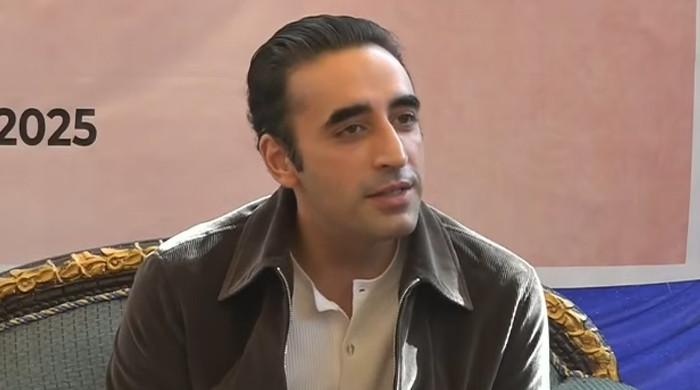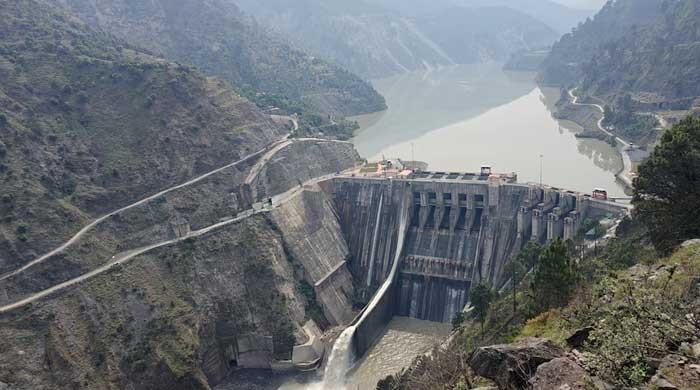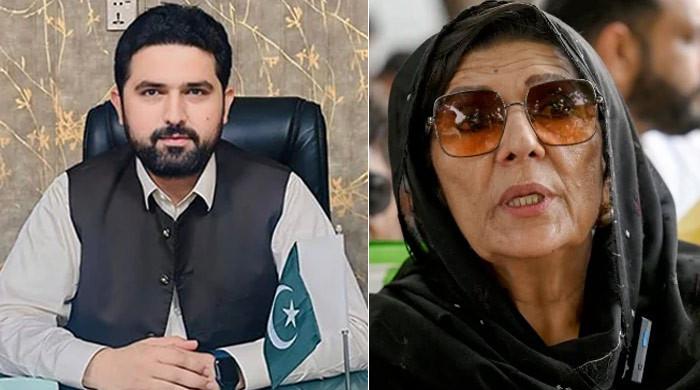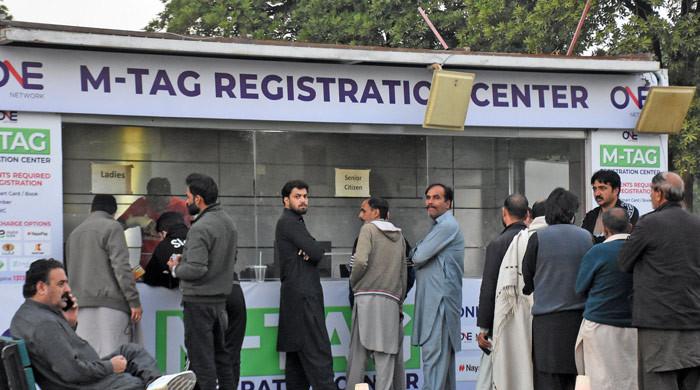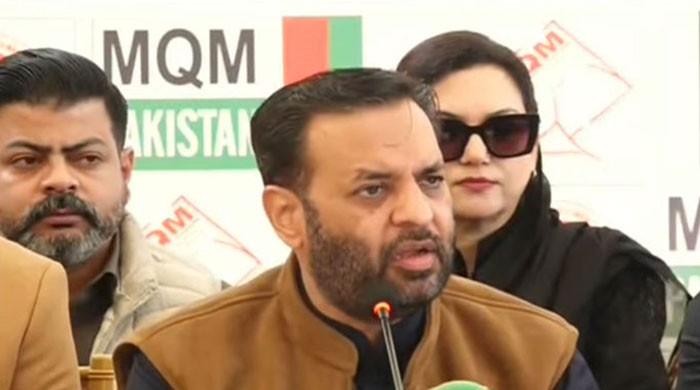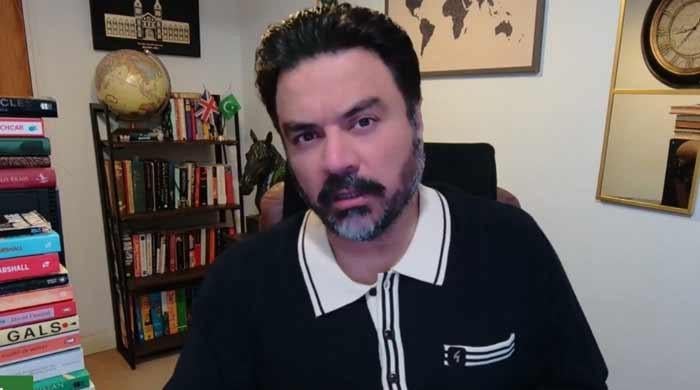Supreme Court questions Army's exemption from NAB law
SC seeks PTI chairman Imran Khan's opinion on issue
December 13, 2022
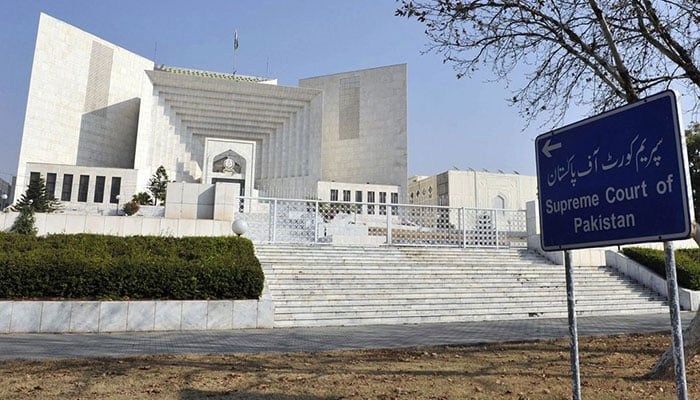
- CJP Umar terms NAB amendments as an 'improvement' in law
- NAB law became pointless after amends: Jutice Aijaz-ul-Ahsan
- Intention behind amendments should be looked into: Imran's council
ISLAMABAD: The Supreme Court (SC) on Monday remarked that the Pakistan Army was not in the ambit of NAB law and asked Pakistan Tehreek-e-Insaf (PTI) chairman about his opinion on the issue.
A three-member SC bench, headed by Chief Justice of Pakistan Umar Ata Bandial and comprising Justice Ijazul Ahsan and Justice Syed Mansoor Ali Shah, heard the Imran Khan's petition, challenging the amendments made by the coalition government to the National Accountability Ordinance (NAO) 1999.
Justice Mansoor observed during the hearing, that even judges are not out of NAB's ambit and asked the lawyer about the reasons for keeping the army exempted from the NAB law.
He asked, “whether this process of keeping the army out of the ambit of NAB law is constitutional or unconstitutional in the eyes of PTI.” The judge asked the counsel to explain this today (Tuesday) during his course of arguments.
Earlier, Justice Mansoor questioned how democracy can flourish when legislators prefer to making decisions on the streets instead of the Parliament.
Khwaja Haris, continuing his arguments on the NAB laws, said that the Supreme Court had filled the legal vacuum in the matter of the extension of the Chief of Army Staff and recalled that the apex court had declared the amendments null and void in Asfandyar Wali Khan case.
Justice Mansoor remarked that in that case, the court declared the law null and void for violating fundamental rights. However, Justice Ijaz ul Ahsea observed that the NAB law has become infructuous after omitting some provisions through the recent amendments.
Justice Ijaz remarked “the petitioner in this case, while challenging the amendments, has prayed for restoring the law to its original shape.” To which Justice Mansoor replied that the amendments to the NAB law do not violate fundamental rights.
CJP Umar termed the amendments as an "improvement" in the NAB law which was heavily criticised for having flaws in it. The CJP remarked “under the law, any person could be arrested and detained for 90 days on mere allegations.”, adding that the recent amendments made to the law are a headway in the country’s law.
Imran Khan's council, however, submitted that the former premier was not in favour of arrests in NAB case during the investigation.
Khawaja Haris added that they don’t want the annulment of all the amendments however, the intention behind the amendments should be looked into.
Justice Mansoor remarked, “To see the intention of Parliament, we will have to see the debates made on the amendments under challenge.” Haris, however, submitted that no debate was held in Parliament on the amendments.
Federation’s counsel had stated that amendments were made in light of the judgments passed by the Supreme Court, remarked Justice Mansoor Ali Shah.
“NAB amends are not based on apex court’s judgments,” Khawaja Haris replied, to which Justice Mansoor inquired whether the public sentiment is also against the amendments or the court should determine that the amendments have affected the public.
The judge observed that the NAB amendments were also challenged in Islamabad High Court (IHC) and asked the PTI counsel if it would be correct when the Supreme Court decides the case. Khawaja Haris replied that it was the choice of the petitioner, who approached the IHC.
The CJP observed that in the Darshan Masih case, the public had approached the court for relief. “Whether the public has approached the court in the NAB amendments case,” he asked the PTI counsel.
Khwaja Haris replied that non-governmental organisations (NGOs) had approached the Supreme Court in the Darshan Masih case, adding that they wish that NGOs should also be established against corruption. Meanwhile, the apex court adjourned the hearing for today (Tuesday) wherein Khwaja Haris will continue his arguments. A three-member SC bench, headed by CJP Umar Ata Bandial and comprising Justice Ijazul Ahsen and Justice Syed Mansoor Ali Shah, heard the Imran Khan's petition, challenging the amendments made by the coalition government to the National Accountability Ordinance (NAO) 1999.
Justice Mansoor observed during the hearing, that even judges are not out of NAB's ambit and asked the lawyer about the reasons for keeping the Army exempted from the NAB law.
He asked, “Whether this process of keeping the army out of the ambit of NAB law is constitutional or unconstitutional in the eyes of PTI.” The judge asked the counsel to explain this today (Tuesday) during his course of arguments.
Earlier, Justice Mansoor questioned how democracy can flourish when legislators prefer to making decisions on the streets instead of the Parliament.
Khwaja Haris, continuing his arguments on the NAB laws, said that the Supreme Court had filled the legal vacuum in the matter of the extension of the Chief of Army Staff and recalled that the apex court had declared the amendments null and void in Asfandyar Wali Khan case.
Justice Mansoor remarked that in that case, the court declared the law null and void for violating fundamental rights. However, Justice Ijaz-ul-Ahsen observed that the NAB law has become infructuous after omitting some provisions through the recent amendments.
Justice Ijaz remarked “the petitioner in this case, while challenging the amendments, has prayed for restoring the law to its original shape.” To which Justice Mansoor replied that the amendments to the NAB law do not violate fundamental rights.
CJP Bandial termed the amendments as an "improvement" in the NAB law which was heavily criticised for having flaws in it. The CJP remarked “under the law, any person could be arrested and detained for 90 days on mere allegations.”, adding that the recent amendments made to the law are a headway in the country’s law.
Imran Khan council, however, submitted that the former Premier was not in favour of arrests in NAB case during the investigation.
Khawaja Haris added that they don’t want the annulment of all the amendments however, the intention behind the amendments should be looked into.
Justice Mansoor remarked, “To see the intention of Parliament, we will have to see the debates made on the amendments under challenge.” Khawaja Haris, however, submitted that no debate was held in Parliament on the amendments.
Federation’s counsel had stated that amendments were made in light of the judgments passed by the Supreme Court, remarked Justice Mansoor Ali Shah.
“NAB amends are not based on apex court’s judgments,” Khawaja Haris replied, to which Justice Mansoor inquired whether the public sentiment is also against the amendments or the court should determine that the amendments have affected the public.
The judge observed that the NAB amendments were also challenged in Islamabad High Court (IHC) and asked the PTI counsel if it would be correct when the Supreme Court decides the case. Khawaja Haris replied that it was the choice of the petitioner, who approached the IHC.
The CJP observed that in the Darshan Masih case, the public had approached the court for relief. “Whether the public has approached the court in the NAB amendments case,” he asked the PTI counsel.
Khawaja Haris replied that non-governmental organisations (NGOs) had approached the Supreme Court in the Darshan Masih case, adding that they wish that NGOs should also be established against corruption. Meanwhile, the apex court adjourned the hearing for today (Tuesday) wherein Khawaja Haris will continue his arguments.




